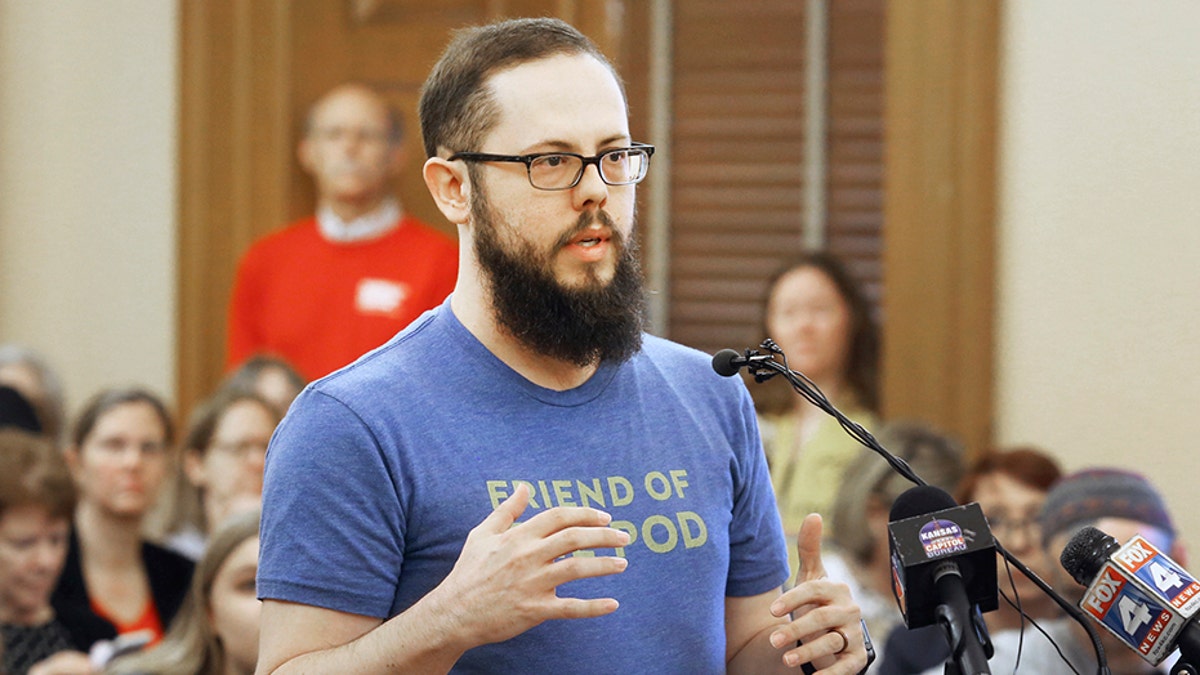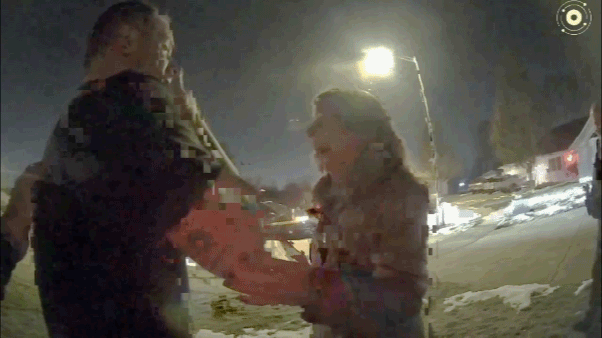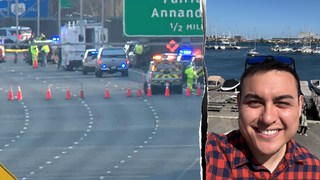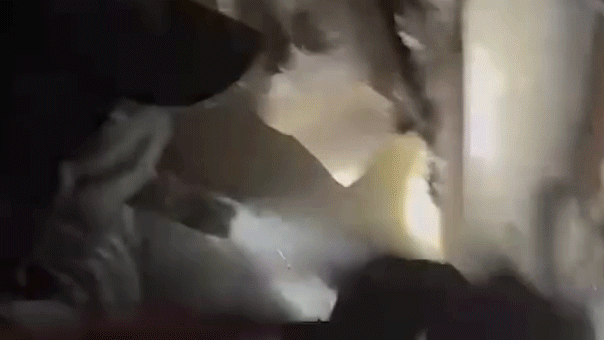
During a hearing in the House Insurance Committee Tuesday, March 27, 2018, in Topeka, Kan., Nick Diegel, an Overland Park resident and parent of a Blue Valley district student, spoke in opposition to a bill that would help Kansas teachers carry concealed guns in their classrooms. Diegel also referenced Rep. Willie Dove, a Bonner Springs Republican who last year removed a handgun from an ankle holder and accidentally left it on the floor of a House committee meeting room. (Thad Allton /The Topeka Capital-Journal via AP)
In the wake of last month’s mass shooting at a Florida high school, at least 10 states across America have provisions in place giving teachers the option of carrying guns in schools, but Kansas may be taking their plans further than most other laws in place or under consideration.
Kansas schools that refuse to allow teachers to carry guns could be held legally responsible in the event of a school tragedy under a proposal drafted recently.
Gun rights advocates argue a teacher with a gun is not only a deterrent to a school shooter, but also the first line of defense in protecting students.
Rep. Blake Carpenter, a conservative Derby Republican who helped write the legislation that holds schools liable, said he is confident armed and trained teachers will save lives. Police could be minutes away, and in smaller districts where modest funding means school-resource officers aren’t hired, the bill would allow for “next best thing,” he told the House Insurance Committee in Kansas.
“It is not, if our kids will be killed. It is, when will they be killed and what are we doing to prevent it?” Carpenter said.
Kansas legislators started working on school safety legislation a week after a Valentine’s Day shooting in Parkland, Florida, left 17 students and staff dead.
There are about 10 states that allow concealed carry weapons on school campuses, such as Utah, as Fox News previously reported; and while the majority of states have laws prohibiting anyone from carrying a gun on school property, there are a select few, like Ohio and Missouri, where school districts can supersede state law and permit their staff to carry guns.
Opponents of the measure, which got its first hearing Tuesday in front of the House Insurance Committee, expressed concern it could effectively mandate arming teachers rather than allowing it, as several states have done.
“It would certainly open the door for that conversation,” said Democratic Rep. Brett Parker, an Overland Park school teacher. “The further we go down this rabbit hole, the more chance there is for even more obnoxious legislation moving forward.”
Even if that provision is stripped, as some advocates suggested during the hearing, the bill would prohibit insurers from denying coverage to a school because it lets its teachers or staff members carry weapons.
Parker said he has received 284 pieces of written testimony opposing the bill, much of it from teachers unhappy with the prospect of being armed and working alongside others who may or may not be.
“We’re inventing new ways, it seems, to drive people out of the teaching profession in Kansas,” Parker said.
The proposal is separate from one embraced by Republican leaders in the House that focuses on improving school infrastructure instead of arming staff. That measure, which appears to have broader support, won first-round approval on Tuesday.
Gun control advocates say the portion that presumes negligence against school districts is highly unusual and seems to match closely with concealed carry laws typically applied to businesses in some states, and not schools.
Kansas law has allowed teachers to carry concealed guns since 2013 but school districts across the state have disallowed the practice after EMC Insurance Companies, the state’s primary school insurer, refused to provide coverage to schools with armed staff.
Kansas Association of School Boards lobbyist Mark Tallman opposed the bill. He said insurance providers could still choose to deny coverage, yet schools would have no choice but to allow staff to arm themselves regardless. Even if an insurer is willing to provide under such circumstances, Tallman said, the rates would become very expensive.
Carpenter said for an insurance company to increase rates or to outright refuse to provide coverage to a school, it would have to prove that having an armed staff creates a higher risk environment.
According to the State Department of Education, the 286 local school districts expect to spend $23.7 million on insurance in the current school year, not including health insurance. No testimony provided during the hearing predicted what that expense would become if the legislation passes.
The Associated Press contributed to this report.










































